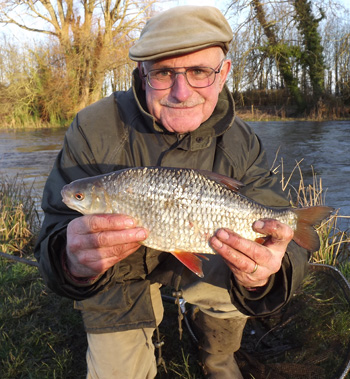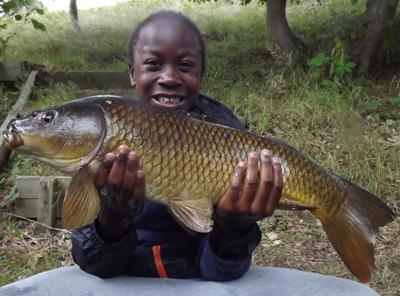Rod Sturdy is back and contemplating the reasons why we go fishing.
Thinking through what we get out of fishing and our possible reasons for doing it can be a really beneficial exercise. Also it can pay to have in mind why we do something so that, as and when the need arises, we can attempt to explain why we do it, and educate people we meet as to its benefits.
We can forget the old and very hackneyed ‘getting out into the countryside’ type of excuse because that’s all it is, and a rather weak one at that. For a start, it applies to too many other types of outdoor activity: walking, mountain climbing, biking, canoeing. Those taking part in any of those activities would be quite offended if you were to suggest that they were just doing it as a way of getting into the open air.
And in any case, why should I need to acquire a load of quite expensive fishing tackle just to get out into the countryside? I could just go. If that was my only motivation you would find me sitting there just soaking in the sounds and sights and enjoying it without the need to handle nasty, slimy fish. No, the ‘out into the countryside’ argument just does not add up.
For me, the chief reason for doing it is to experience the glorious – and very fundamental – thrill of the hunter and simply catching a decent fish will make it all worthwhile. Experiencing the well-known ‘shakes’ when you succeed is in my view a fundamental experience which large numbers of mankind no longer know. A lot of this has to do with the fact that the majority of the human race now lives in towns and cities, where the instinct to hunt and fish can easily be forgotten. In the era of fast food and instant results, it is pushed to the back of the mind, but it is nonetheless still there.
Equally important for us to consider is the opposite question ‘Fishing – why should we NOT do it?’
The classic ‘anti’ argument is that fishing is one of those activities which involve man’s exploitation of other creatures for his amusement and gratification. In the rantings of PETA and similar organisations, it belongs with other activities such as meat-eating, shooting, and other forms of what they consider mass murder.
Truth to tell, ‘exploitation’ of other species is part of the universal order. Take food for example: the fact is that for something to continue existing, something else has to pay the ultimate price, even if the something else is only a cabbage.
Coarse fishing comes in for particular criticism from the antis because fish are, as a rule, returned to the water alive. There is no ‘excuse’ that fish caught end up on the table so it therefore counts as one of the ultimate means of using other creatures for your own amusement. Along with horse racing, another favourite target of the extremists.
Within the mainstream conservation movement there exists a growing realisation that species which are hunted/fished for in a controlled, legitimate way – as opposed to just being poached – will tend to have a much better chance of avoiding disappearance. To the average member of the public this sounds like total nonsense. But if you think about it, it makes sense. The species concerned will automatically have an interest group lobbying for it: there has been a lot of concern about dwindling numbers of barbel recently – and who is expressing that concern? Why, barbel anglers, of course.
Of course no true anti will ever be persuaded by the obvious (when you think about it) argument that fishing adds to the environment: creating a fishery will provide – to use a phrase which has been in use a lot recently – ‘a home for nature’. A lake environment will attract and keep numerous forms of wildlife. Re-stocking a river, or – as an angling club I am a member of has recently been doing – clearing out thousands of alien signal crayfish from it, can only enhance the environment.
God knows, the environment needs some helping. A statistic from the World Wildlife Fund I heard recently is that, worldwide, natural populations have declined by some 52% over the past 40 years. If fishing can contribute something to redressing that loss, then we as anglers can be proud of it.
Apart from that, fishing of course provides a necessary direct contact with the natural world, a lot more than just getting out into the countryside. This involves among other things the safe handling and care of other creatures, and giving kids a sense of their responsibility towards the natural world.
And contact with this other world will provide a necessary antidote to what nowadays seems to be the norm: an indoor life based around the Internet and mass media. Not to mention TV wildlife programmes which hardly, if ever, touch on the subject of the ‘wildlife’ which exists beneath the surface of fresh water.
I hope that the above gives you a few ideas for when you come across people who wonder what fishing is all about. Or even those who are slightly dubious about what we do, or even a bit hostile. Nobody of course can persuade the real antis of anything. They are permanently on their own agenda and totally blinkered to any other view. But of course they are totally committed to persuading the general public to accept their twisted ideas.
The fact that fishing also – to use an old phrase – ‘keeps kids off the streets’ is a bonus of course. But it is not the main reason why they should go fishing. It is rather like the ‘out into the countryside’ argument, except in reverse. There are many activities which could help to keep kids off the streets and presumably away from the temptation to get involved in street brawls, excessive alcohol consumption, drugs and the rest. Fishing happens to be one of these activities, but its real benefits lie in what it takes kids to, not just from.
Which brings me to my final point. If fishing is to have a real future and hold its own against other interests, all trying to stake a claim to various bits of the countryside, including rivers and lakes, and claiming to provide healthy activities for children to take part in, then it should have strong representation. It should have the means to influence and lobby politicians and other decision-makers.
And of course the organisation which represents us should have the will and the means to recruit new anglers, including principally young ones. So that our sport has a real future.
See the Angling Trust website for ways for YOU as an individual angler to play your part in providing angling with a strong voice: membership, donations, and voluntary work.
Your sport needs you!
ABOUT THE AUTHOR
 Rod Sturdy
Rod Sturdy
Rod began fishing in his local park lake at the age of twelve, and from there he graduated to chub and roach from the river Tees in North Yorkshire. He now lives in Surrey within striking distance of the river Mole, as well as the Medway and the Eden in Kent and does a lot of surface carp fishing on small waters in the area. Latterly he has enjoyed winter fishing on the Test in Hampshire.
He has contributed numerous articles on various angling subjects and personalities to ‘Waterlog’ magazine and remains a passionate angler as well as a member and promoter of the Angling Trust.














